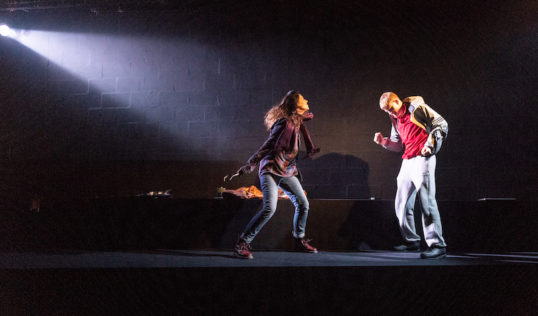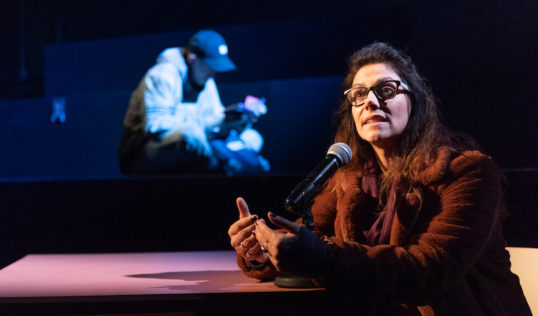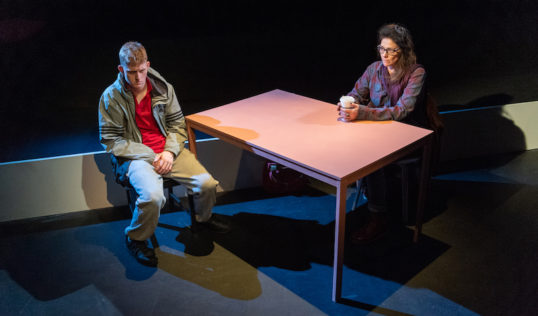Mouthpiece
★★★☆☆ Political emotion
Traverse: Sat 1 – Sat 22 Dec2018
Review by Hugh Simpson
Tickets and details: Book here.
There is much to admire about the staging of Mouthpiece at the Traverse, and even more about how it is acted. In the end, however, the play tantalises rather than delivers.
Two sides of Edinburgh collide in Kieran Hurley’s play, when apparently washed-up playwright Libby is saved from suicide on Salisbury Crags by Declan, a teenager with a penchant for drawing who is struggling with an abusive home life. An unlikely relationship follows, with much musing on the art of storytelling and who has access to power and culture.
The notion of the capital as a divided city was a well-worn one even in Stevenson’s day. While it is just as true of plenty of other places, it did have a special resonance when all of the social classes lived cheek by jowl – but that has not been the case since the building of the New Town, let alone the development of the peripheral housing scheme.
The way that so many are excluded from discussions that are conducted by a frighteningly small section of society is, of course, an important matter, made even more serious as a growing precariat are battered by austerity. However, the good intentions of the piece do not necessarily make for a coherent drama.
While Hurley’s script is unsurprisingly fizzing with ideas, it is an almost wilfully uneven thing that struggles to convince. Unsure as to whether it is a state-of-the-nation address or a love story, it ends up satisfying as neither.
Despite two magnetic central performances, the relationship between the characters never entirely rings true. Lorn Macdonald’s Declan is a ball of energy, emanating enough life for several shows, but the character has elements of the time-honoured Edinburgh radge that are just too knowing, and too much of the butt of patronising laughter.
stereotypical tropes
Neve McIntosh’s Libby, meanwhile, is a worryingly believable portrait of someone who has just made too many wrong decisions, but is once again wrapped up in just too many stereotypical tropes of the Edinburgh middle classes. Two worlds with so little knowledge of each other are never brought together enough for some of the odd lurches in their relationship to pay off.
What does not help is that so much of the discussion about the nature of storytelling is couched in discussions of the workings of the theatre, the structure of a drama and the hard life of a playwright – things that are of far less interest to audiences than the professionals sometimes think.
It eventually becomes so self-consciously theatrical, including – spoiler alert and heaven help us – a depiction of a Q and A session after a play in the Traverse taking place in that very building. If that is your thing, you will love this, but there surely must be a case for a complete moratorium on all plays about theatre with characters who are playwrights.
Forced jokes about things being ‘meta’ are thoroughly unnecessary. What this means is, that rather than being thought-provoking, it ends up being the opposite – a self-referential piece that by its very nature closes off avenues of discussion rather than opening them up.
never less than impressive
The problem is one of too many ideas being insufficiently thought out, rather than a lack of them. The presentation of the play, meanwhile, is never less than impressive. Kai Fischer’s design is excellent, with superb use of projection and a set that works equally well as the Crags and as a depiction of Traverse One inside Traverse Two. Kim Moore’s sound design is equally good, with one moment (as music from Libby’s phone bleeds through into the whole auditorium) that is utterly magical.
Orla O’Loughlin’s direction, meanwhile, is gorgeously and characteristically limpid, making such apparently effortless use of the actors and the auditorium that it reinforces what a loss to the Edinburgh theatre scene her departure will be.
However, even such attention to detail – and the efforts of two excellent performers – cannot compensate for the infuriating nature of the narrative.
Running time: one hour and 30 minutes (no interval)
Traverse Theatre, 10 Cambridge Street, EH1 2ED
Saturday 1– Saturday 22 December 2018
Tues- Sat at 8.00 pm; Matinees: Thurs & Sat 2.30 pm.
Tickets and details: Book here.
ENDS





















